Entrepreneurship and Small Business Management: A Detailed Analysis
VerifiedAdded on 2021/02/20
|17
|5258
|22
Report
AI Summary
This report comprehensively examines the multifaceted world of entrepreneurship and small business management. It begins by defining entrepreneurship and analyzing different types of ventures, including small, large, social, and scalable start-ups, and how they relate to the typology of entrepreneurship, such as lifestyle and growth firms. The report then delves into the similarities and differences between various entrepreneurial ventures. It also explores creativity and innovation, including how businesses protect intellectual property rights. Furthermore, the report interprets and assesses relevant data and statistics to illustrate the impact of micro and small businesses on the economy, emphasizing their role in job creation and economic development. The report also details the significance of small businesses and start-ups in economic growth. It identifies the characteristic traits and skills of successful entrepreneurs, assesses how personality reflects motivation and mindset, and examines how background and experience can hinder or foster entrepreneurship, culminating in a comprehensive overview of the entrepreneurial landscape.

Entrepreneurship and
Small business
management
Small business
management
Paraphrase This Document
Need a fresh take? Get an instant paraphrase of this document with our AI Paraphraser
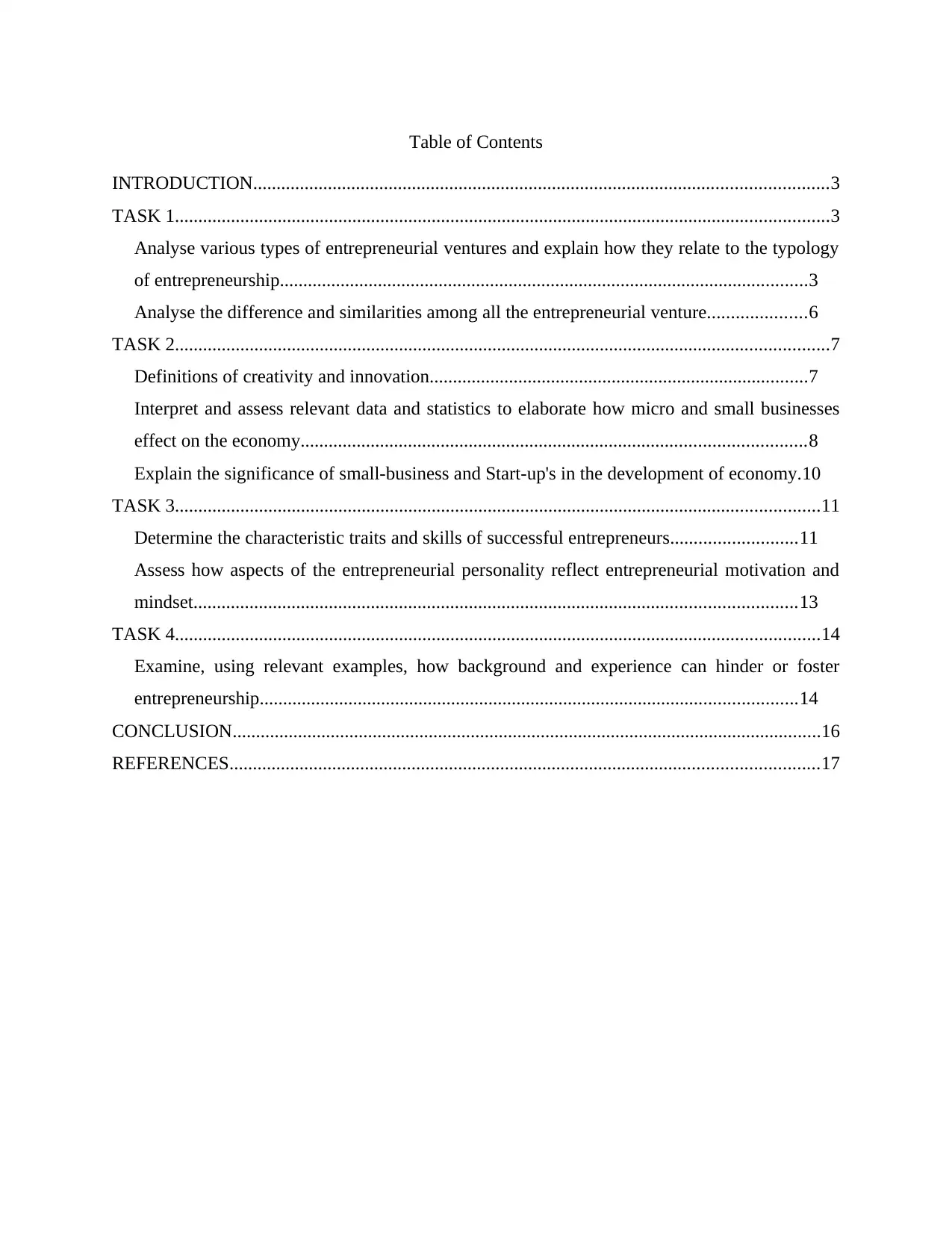
Table of Contents
INTRODUCTION...........................................................................................................................3
TASK 1............................................................................................................................................3
Analyse various types of entrepreneurial ventures and explain how they relate to the typology
of entrepreneurship.................................................................................................................3
Analyse the difference and similarities among all the entrepreneurial venture.....................6
TASK 2............................................................................................................................................7
Definitions of creativity and innovation.................................................................................7
Interpret and assess relevant data and statistics to elaborate how micro and small businesses
effect on the economy............................................................................................................8
Explain the significance of small-business and Start-up's in the development of economy.10
TASK 3..........................................................................................................................................11
Determine the characteristic traits and skills of successful entrepreneurs...........................11
Assess how aspects of the entrepreneurial personality reflect entrepreneurial motivation and
mindset.................................................................................................................................13
TASK 4..........................................................................................................................................14
Examine, using relevant examples, how background and experience can hinder or foster
entrepreneurship...................................................................................................................14
CONCLUSION..............................................................................................................................16
REFERENCES..............................................................................................................................17
INTRODUCTION...........................................................................................................................3
TASK 1............................................................................................................................................3
Analyse various types of entrepreneurial ventures and explain how they relate to the typology
of entrepreneurship.................................................................................................................3
Analyse the difference and similarities among all the entrepreneurial venture.....................6
TASK 2............................................................................................................................................7
Definitions of creativity and innovation.................................................................................7
Interpret and assess relevant data and statistics to elaborate how micro and small businesses
effect on the economy............................................................................................................8
Explain the significance of small-business and Start-up's in the development of economy.10
TASK 3..........................................................................................................................................11
Determine the characteristic traits and skills of successful entrepreneurs...........................11
Assess how aspects of the entrepreneurial personality reflect entrepreneurial motivation and
mindset.................................................................................................................................13
TASK 4..........................................................................................................................................14
Examine, using relevant examples, how background and experience can hinder or foster
entrepreneurship...................................................................................................................14
CONCLUSION..............................................................................................................................16
REFERENCES..............................................................................................................................17
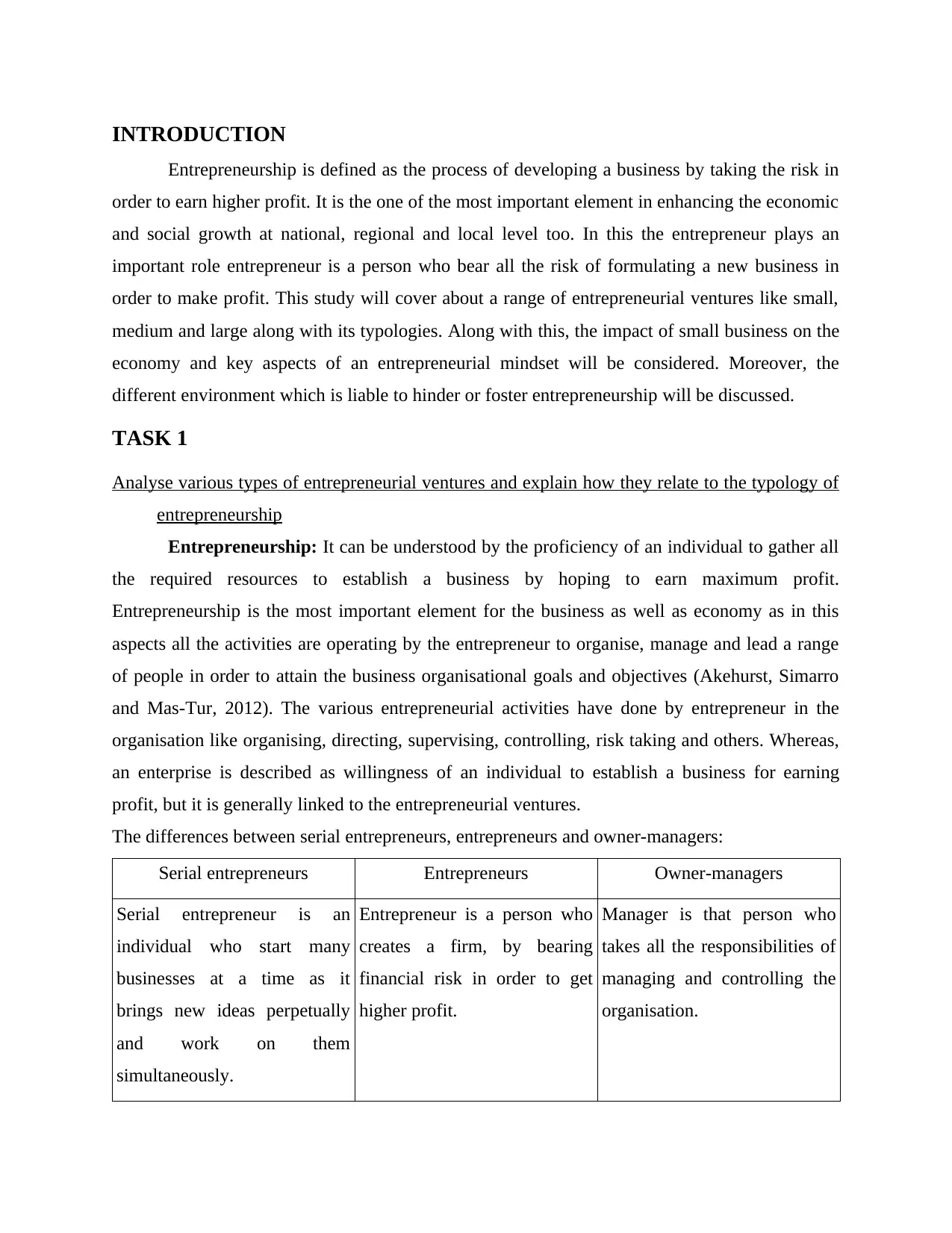
INTRODUCTION
Entrepreneurship is defined as the process of developing a business by taking the risk in
order to earn higher profit. It is the one of the most important element in enhancing the economic
and social growth at national, regional and local level too. In this the entrepreneur plays an
important role entrepreneur is a person who bear all the risk of formulating a new business in
order to make profit. This study will cover about a range of entrepreneurial ventures like small,
medium and large along with its typologies. Along with this, the impact of small business on the
economy and key aspects of an entrepreneurial mindset will be considered. Moreover, the
different environment which is liable to hinder or foster entrepreneurship will be discussed.
TASK 1
Analyse various types of entrepreneurial ventures and explain how they relate to the typology of
entrepreneurship
Entrepreneurship: It can be understood by the proficiency of an individual to gather all
the required resources to establish a business by hoping to earn maximum profit.
Entrepreneurship is the most important element for the business as well as economy as in this
aspects all the activities are operating by the entrepreneur to organise, manage and lead a range
of people in order to attain the business organisational goals and objectives (Akehurst, Simarro
and Mas‐Tur, 2012). The various entrepreneurial activities have done by entrepreneur in the
organisation like organising, directing, supervising, controlling, risk taking and others. Whereas,
an enterprise is described as willingness of an individual to establish a business for earning
profit, but it is generally linked to the entrepreneurial ventures.
The differences between serial entrepreneurs, entrepreneurs and owner-managers:
Serial entrepreneurs Entrepreneurs Owner-managers
Serial entrepreneur is an
individual who start many
businesses at a time as it
brings new ideas perpetually
and work on them
simultaneously.
Entrepreneur is a person who
creates a firm, by bearing
financial risk in order to get
higher profit.
Manager is that person who
takes all the responsibilities of
managing and controlling the
organisation.
Entrepreneurship is defined as the process of developing a business by taking the risk in
order to earn higher profit. It is the one of the most important element in enhancing the economic
and social growth at national, regional and local level too. In this the entrepreneur plays an
important role entrepreneur is a person who bear all the risk of formulating a new business in
order to make profit. This study will cover about a range of entrepreneurial ventures like small,
medium and large along with its typologies. Along with this, the impact of small business on the
economy and key aspects of an entrepreneurial mindset will be considered. Moreover, the
different environment which is liable to hinder or foster entrepreneurship will be discussed.
TASK 1
Analyse various types of entrepreneurial ventures and explain how they relate to the typology of
entrepreneurship
Entrepreneurship: It can be understood by the proficiency of an individual to gather all
the required resources to establish a business by hoping to earn maximum profit.
Entrepreneurship is the most important element for the business as well as economy as in this
aspects all the activities are operating by the entrepreneur to organise, manage and lead a range
of people in order to attain the business organisational goals and objectives (Akehurst, Simarro
and Mas‐Tur, 2012). The various entrepreneurial activities have done by entrepreneur in the
organisation like organising, directing, supervising, controlling, risk taking and others. Whereas,
an enterprise is described as willingness of an individual to establish a business for earning
profit, but it is generally linked to the entrepreneurial ventures.
The differences between serial entrepreneurs, entrepreneurs and owner-managers:
Serial entrepreneurs Entrepreneurs Owner-managers
Serial entrepreneur is an
individual who start many
businesses at a time as it
brings new ideas perpetually
and work on them
simultaneously.
Entrepreneur is a person who
creates a firm, by bearing
financial risk in order to get
higher profit.
Manager is that person who
takes all the responsibilities of
managing and controlling the
organisation.
⊘ This is a preview!⊘
Do you want full access?
Subscribe today to unlock all pages.

Trusted by 1+ million students worldwide
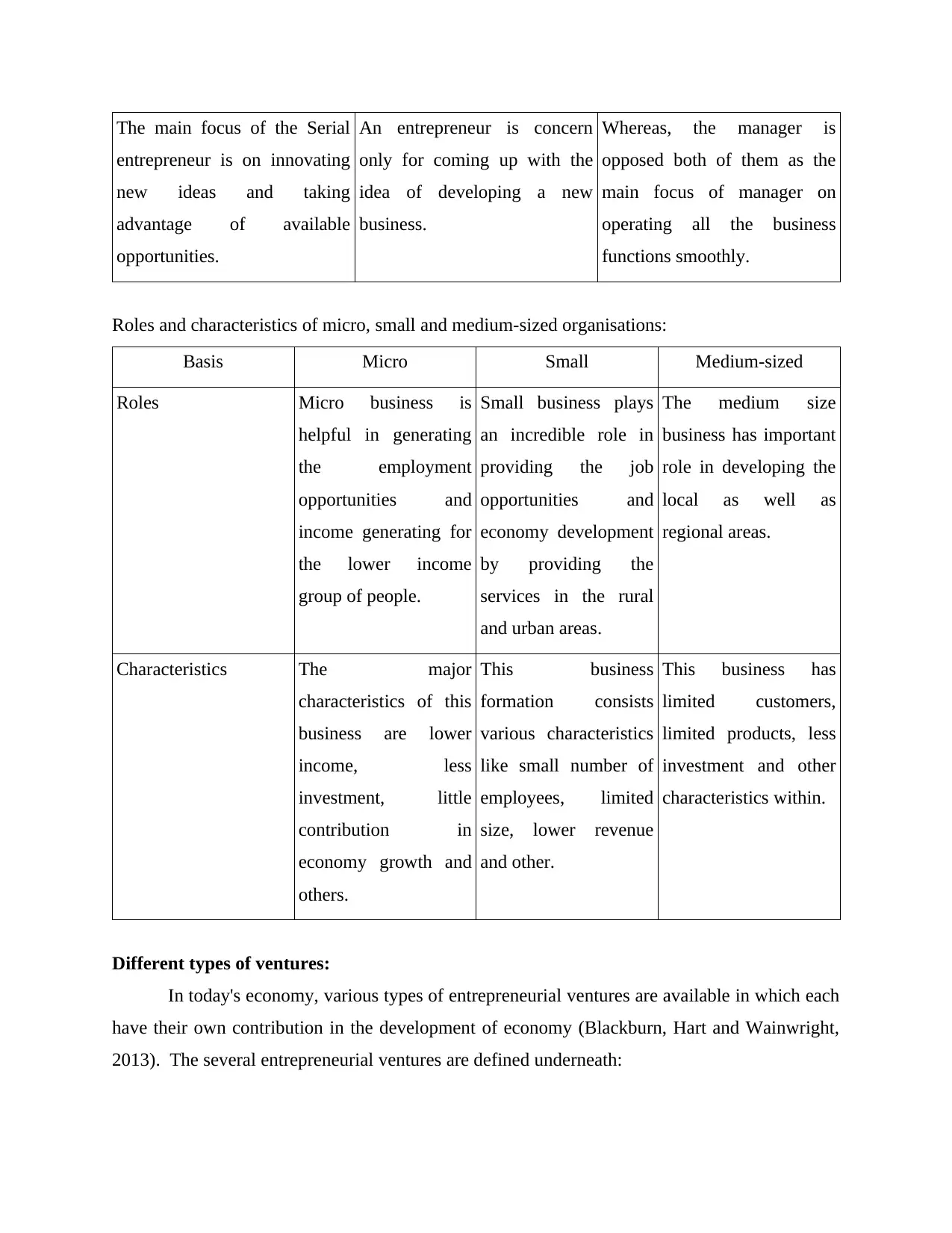
The main focus of the Serial
entrepreneur is on innovating
new ideas and taking
advantage of available
opportunities.
An entrepreneur is concern
only for coming up with the
idea of developing a new
business.
Whereas, the manager is
opposed both of them as the
main focus of manager on
operating all the business
functions smoothly.
Roles and characteristics of micro, small and medium-sized organisations:
Basis Micro Small Medium-sized
Roles Micro business is
helpful in generating
the employment
opportunities and
income generating for
the lower income
group of people.
Small business plays
an incredible role in
providing the job
opportunities and
economy development
by providing the
services in the rural
and urban areas.
The medium size
business has important
role in developing the
local as well as
regional areas.
Characteristics The major
characteristics of this
business are lower
income, less
investment, little
contribution in
economy growth and
others.
This business
formation consists
various characteristics
like small number of
employees, limited
size, lower revenue
and other.
This business has
limited customers,
limited products, less
investment and other
characteristics within.
Different types of ventures:
In today's economy, various types of entrepreneurial ventures are available in which each
have their own contribution in the development of economy (Blackburn, Hart and Wainwright,
2013). The several entrepreneurial ventures are defined underneath:
entrepreneur is on innovating
new ideas and taking
advantage of available
opportunities.
An entrepreneur is concern
only for coming up with the
idea of developing a new
business.
Whereas, the manager is
opposed both of them as the
main focus of manager on
operating all the business
functions smoothly.
Roles and characteristics of micro, small and medium-sized organisations:
Basis Micro Small Medium-sized
Roles Micro business is
helpful in generating
the employment
opportunities and
income generating for
the lower income
group of people.
Small business plays
an incredible role in
providing the job
opportunities and
economy development
by providing the
services in the rural
and urban areas.
The medium size
business has important
role in developing the
local as well as
regional areas.
Characteristics The major
characteristics of this
business are lower
income, less
investment, little
contribution in
economy growth and
others.
This business
formation consists
various characteristics
like small number of
employees, limited
size, lower revenue
and other.
This business has
limited customers,
limited products, less
investment and other
characteristics within.
Different types of ventures:
In today's economy, various types of entrepreneurial ventures are available in which each
have their own contribution in the development of economy (Blackburn, Hart and Wainwright,
2013). The several entrepreneurial ventures are defined underneath:
Paraphrase This Document
Need a fresh take? Get an instant paraphrase of this document with our AI Paraphraser
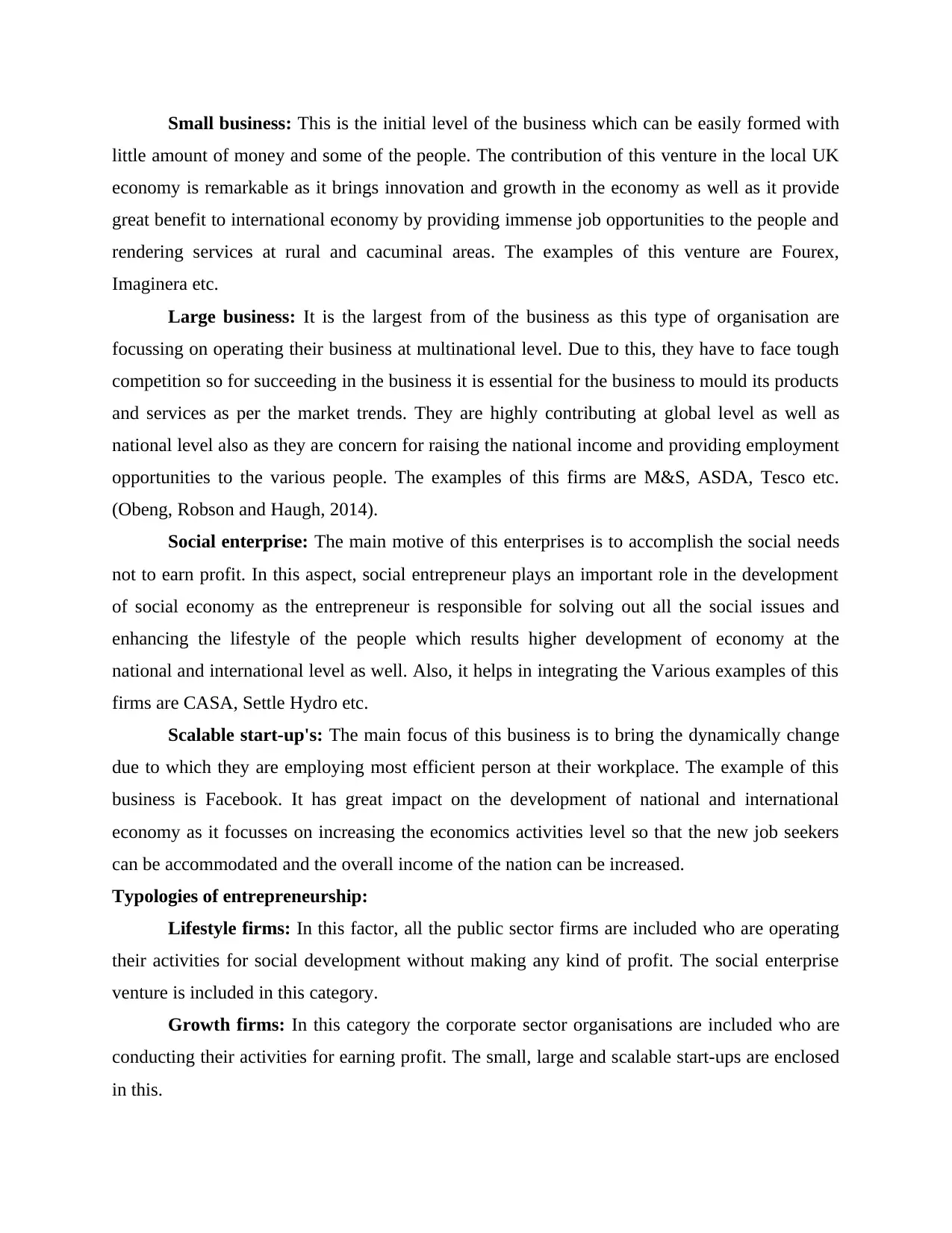
Small business: This is the initial level of the business which can be easily formed with
little amount of money and some of the people. The contribution of this venture in the local UK
economy is remarkable as it brings innovation and growth in the economy as well as it provide
great benefit to international economy by providing immense job opportunities to the people and
rendering services at rural and cacuminal areas. The examples of this venture are Fourex,
Imaginera etc.
Large business: It is the largest from of the business as this type of organisation are
focussing on operating their business at multinational level. Due to this, they have to face tough
competition so for succeeding in the business it is essential for the business to mould its products
and services as per the market trends. They are highly contributing at global level as well as
national level also as they are concern for raising the national income and providing employment
opportunities to the various people. The examples of this firms are M&S, ASDA, Tesco etc.
(Obeng, Robson and Haugh, 2014).
Social enterprise: The main motive of this enterprises is to accomplish the social needs
not to earn profit. In this aspect, social entrepreneur plays an important role in the development
of social economy as the entrepreneur is responsible for solving out all the social issues and
enhancing the lifestyle of the people which results higher development of economy at the
national and international level as well. Also, it helps in integrating the Various examples of this
firms are CASA, Settle Hydro etc.
Scalable start-up's: The main focus of this business is to bring the dynamically change
due to which they are employing most efficient person at their workplace. The example of this
business is Facebook. It has great impact on the development of national and international
economy as it focusses on increasing the economics activities level so that the new job seekers
can be accommodated and the overall income of the nation can be increased.
Typologies of entrepreneurship:
Lifestyle firms: In this factor, all the public sector firms are included who are operating
their activities for social development without making any kind of profit. The social enterprise
venture is included in this category.
Growth firms: In this category the corporate sector organisations are included who are
conducting their activities for earning profit. The small, large and scalable start-ups are enclosed
in this.
little amount of money and some of the people. The contribution of this venture in the local UK
economy is remarkable as it brings innovation and growth in the economy as well as it provide
great benefit to international economy by providing immense job opportunities to the people and
rendering services at rural and cacuminal areas. The examples of this venture are Fourex,
Imaginera etc.
Large business: It is the largest from of the business as this type of organisation are
focussing on operating their business at multinational level. Due to this, they have to face tough
competition so for succeeding in the business it is essential for the business to mould its products
and services as per the market trends. They are highly contributing at global level as well as
national level also as they are concern for raising the national income and providing employment
opportunities to the various people. The examples of this firms are M&S, ASDA, Tesco etc.
(Obeng, Robson and Haugh, 2014).
Social enterprise: The main motive of this enterprises is to accomplish the social needs
not to earn profit. In this aspect, social entrepreneur plays an important role in the development
of social economy as the entrepreneur is responsible for solving out all the social issues and
enhancing the lifestyle of the people which results higher development of economy at the
national and international level as well. Also, it helps in integrating the Various examples of this
firms are CASA, Settle Hydro etc.
Scalable start-up's: The main focus of this business is to bring the dynamically change
due to which they are employing most efficient person at their workplace. The example of this
business is Facebook. It has great impact on the development of national and international
economy as it focusses on increasing the economics activities level so that the new job seekers
can be accommodated and the overall income of the nation can be increased.
Typologies of entrepreneurship:
Lifestyle firms: In this factor, all the public sector firms are included who are operating
their activities for social development without making any kind of profit. The social enterprise
venture is included in this category.
Growth firms: In this category the corporate sector organisations are included who are
conducting their activities for earning profit. The small, large and scalable start-ups are enclosed
in this.
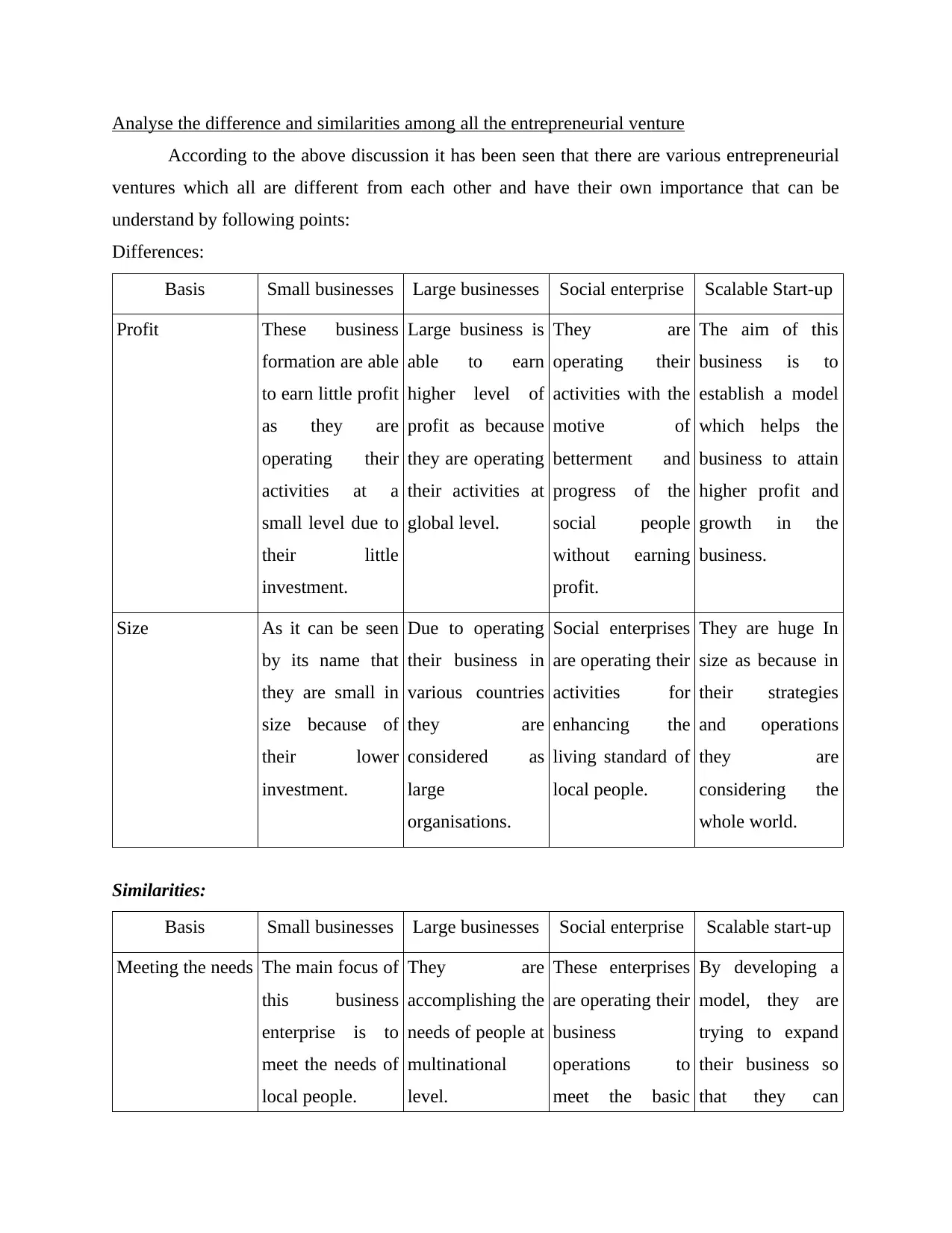
Analyse the difference and similarities among all the entrepreneurial venture
According to the above discussion it has been seen that there are various entrepreneurial
ventures which all are different from each other and have their own importance that can be
understand by following points:
Differences:
Basis Small businesses Large businesses Social enterprise Scalable Start-up
Profit These business
formation are able
to earn little profit
as they are
operating their
activities at a
small level due to
their little
investment.
Large business is
able to earn
higher level of
profit as because
they are operating
their activities at
global level.
They are
operating their
activities with the
motive of
betterment and
progress of the
social people
without earning
profit.
The aim of this
business is to
establish a model
which helps the
business to attain
higher profit and
growth in the
business.
Size As it can be seen
by its name that
they are small in
size because of
their lower
investment.
Due to operating
their business in
various countries
they are
considered as
large
organisations.
Social enterprises
are operating their
activities for
enhancing the
living standard of
local people.
They are huge In
size as because in
their strategies
and operations
they are
considering the
whole world.
Similarities:
Basis Small businesses Large businesses Social enterprise Scalable start-up
Meeting the needs The main focus of
this business
enterprise is to
meet the needs of
local people.
They are
accomplishing the
needs of people at
multinational
level.
These enterprises
are operating their
business
operations to
meet the basic
By developing a
model, they are
trying to expand
their business so
that they can
According to the above discussion it has been seen that there are various entrepreneurial
ventures which all are different from each other and have their own importance that can be
understand by following points:
Differences:
Basis Small businesses Large businesses Social enterprise Scalable Start-up
Profit These business
formation are able
to earn little profit
as they are
operating their
activities at a
small level due to
their little
investment.
Large business is
able to earn
higher level of
profit as because
they are operating
their activities at
global level.
They are
operating their
activities with the
motive of
betterment and
progress of the
social people
without earning
profit.
The aim of this
business is to
establish a model
which helps the
business to attain
higher profit and
growth in the
business.
Size As it can be seen
by its name that
they are small in
size because of
their lower
investment.
Due to operating
their business in
various countries
they are
considered as
large
organisations.
Social enterprises
are operating their
activities for
enhancing the
living standard of
local people.
They are huge In
size as because in
their strategies
and operations
they are
considering the
whole world.
Similarities:
Basis Small businesses Large businesses Social enterprise Scalable start-up
Meeting the needs The main focus of
this business
enterprise is to
meet the needs of
local people.
They are
accomplishing the
needs of people at
multinational
level.
These enterprises
are operating their
business
operations to
meet the basic
By developing a
model, they are
trying to expand
their business so
that they can
⊘ This is a preview!⊘
Do you want full access?
Subscribe today to unlock all pages.

Trusted by 1+ million students worldwide
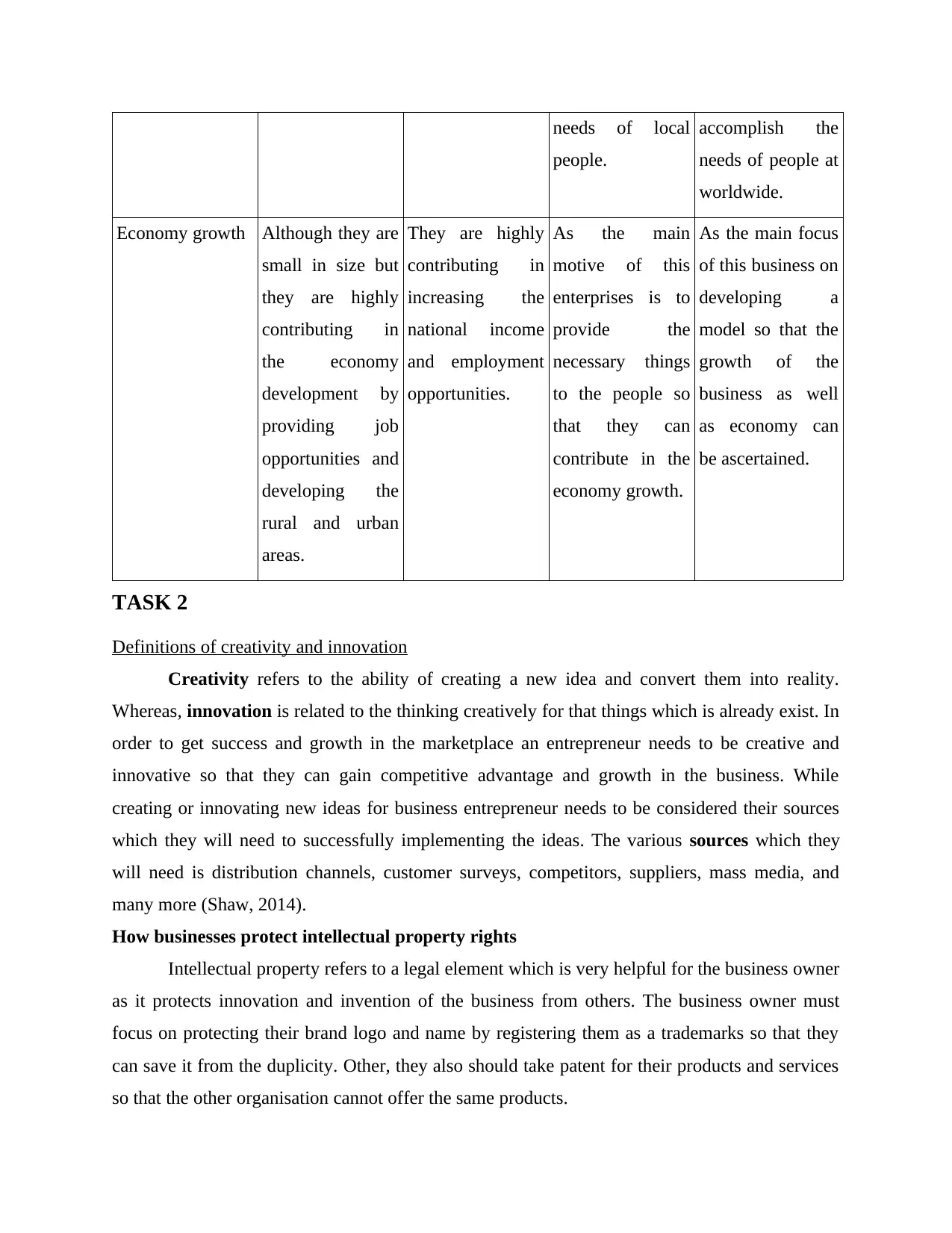
needs of local
people.
accomplish the
needs of people at
worldwide.
Economy growth Although they are
small in size but
they are highly
contributing in
the economy
development by
providing job
opportunities and
developing the
rural and urban
areas.
They are highly
contributing in
increasing the
national income
and employment
opportunities.
As the main
motive of this
enterprises is to
provide the
necessary things
to the people so
that they can
contribute in the
economy growth.
As the main focus
of this business on
developing a
model so that the
growth of the
business as well
as economy can
be ascertained.
TASK 2
Definitions of creativity and innovation
Creativity refers to the ability of creating a new idea and convert them into reality.
Whereas, innovation is related to the thinking creatively for that things which is already exist. In
order to get success and growth in the marketplace an entrepreneur needs to be creative and
innovative so that they can gain competitive advantage and growth in the business. While
creating or innovating new ideas for business entrepreneur needs to be considered their sources
which they will need to successfully implementing the ideas. The various sources which they
will need is distribution channels, customer surveys, competitors, suppliers, mass media, and
many more (Shaw, 2014).
How businesses protect intellectual property rights
Intellectual property refers to a legal element which is very helpful for the business owner
as it protects innovation and invention of the business from others. The business owner must
focus on protecting their brand logo and name by registering them as a trademarks so that they
can save it from the duplicity. Other, they also should take patent for their products and services
so that the other organisation cannot offer the same products.
people.
accomplish the
needs of people at
worldwide.
Economy growth Although they are
small in size but
they are highly
contributing in
the economy
development by
providing job
opportunities and
developing the
rural and urban
areas.
They are highly
contributing in
increasing the
national income
and employment
opportunities.
As the main
motive of this
enterprises is to
provide the
necessary things
to the people so
that they can
contribute in the
economy growth.
As the main focus
of this business on
developing a
model so that the
growth of the
business as well
as economy can
be ascertained.
TASK 2
Definitions of creativity and innovation
Creativity refers to the ability of creating a new idea and convert them into reality.
Whereas, innovation is related to the thinking creatively for that things which is already exist. In
order to get success and growth in the marketplace an entrepreneur needs to be creative and
innovative so that they can gain competitive advantage and growth in the business. While
creating or innovating new ideas for business entrepreneur needs to be considered their sources
which they will need to successfully implementing the ideas. The various sources which they
will need is distribution channels, customer surveys, competitors, suppliers, mass media, and
many more (Shaw, 2014).
How businesses protect intellectual property rights
Intellectual property refers to a legal element which is very helpful for the business owner
as it protects innovation and invention of the business from others. The business owner must
focus on protecting their brand logo and name by registering them as a trademarks so that they
can save it from the duplicity. Other, they also should take patent for their products and services
so that the other organisation cannot offer the same products.
Paraphrase This Document
Need a fresh take? Get an instant paraphrase of this document with our AI Paraphraser
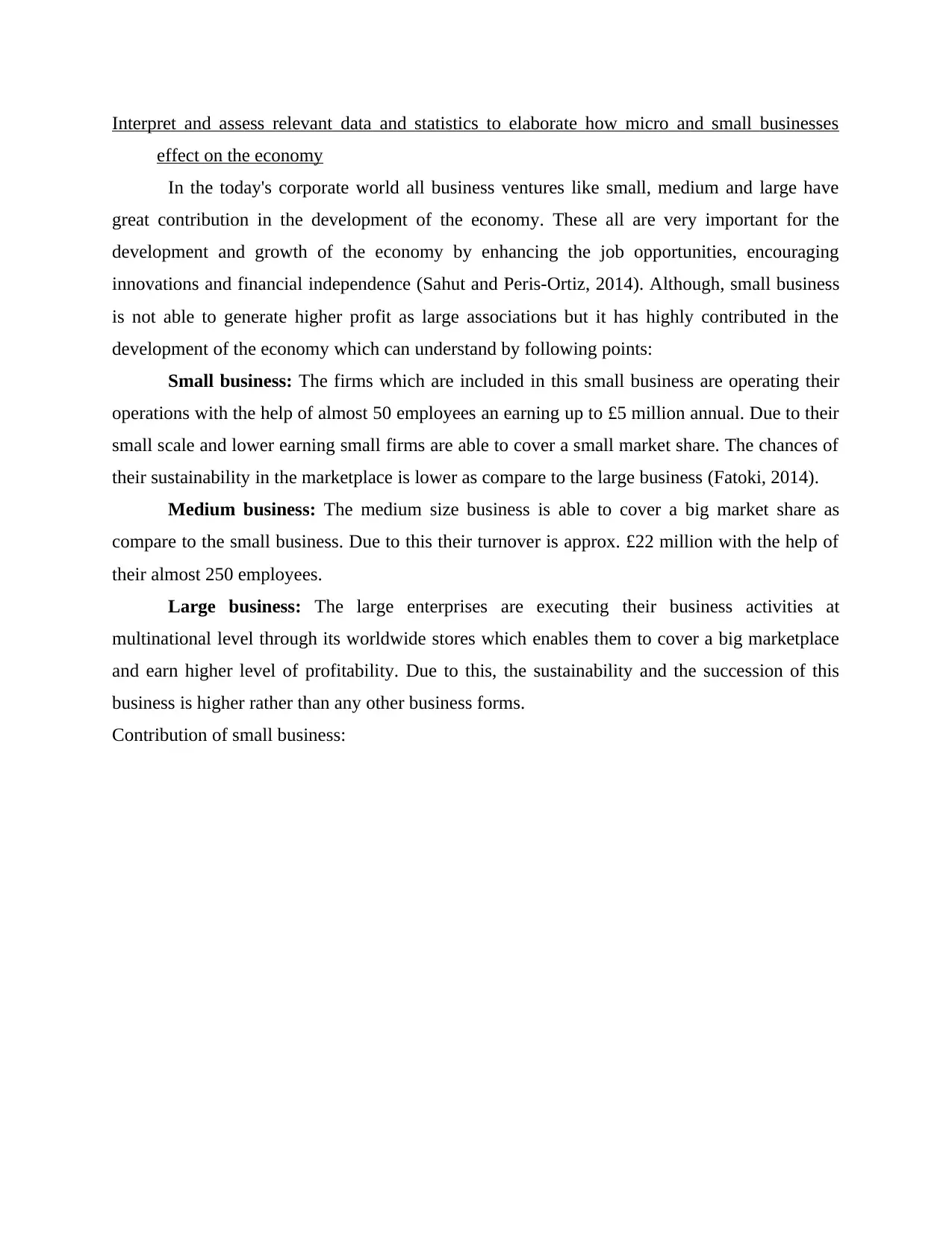
Interpret and assess relevant data and statistics to elaborate how micro and small businesses
effect on the economy
In the today's corporate world all business ventures like small, medium and large have
great contribution in the development of the economy. These all are very important for the
development and growth of the economy by enhancing the job opportunities, encouraging
innovations and financial independence (Sahut and Peris-Ortiz, 2014). Although, small business
is not able to generate higher profit as large associations but it has highly contributed in the
development of the economy which can understand by following points:
Small business: The firms which are included in this small business are operating their
operations with the help of almost 50 employees an earning up to £5 million annual. Due to their
small scale and lower earning small firms are able to cover a small market share. The chances of
their sustainability in the marketplace is lower as compare to the large business (Fatoki, 2014).
Medium business: The medium size business is able to cover a big market share as
compare to the small business. Due to this their turnover is approx. £22 million with the help of
their almost 250 employees.
Large business: The large enterprises are executing their business activities at
multinational level through its worldwide stores which enables them to cover a big marketplace
and earn higher level of profitability. Due to this, the sustainability and the succession of this
business is higher rather than any other business forms.
Contribution of small business:
effect on the economy
In the today's corporate world all business ventures like small, medium and large have
great contribution in the development of the economy. These all are very important for the
development and growth of the economy by enhancing the job opportunities, encouraging
innovations and financial independence (Sahut and Peris-Ortiz, 2014). Although, small business
is not able to generate higher profit as large associations but it has highly contributed in the
development of the economy which can understand by following points:
Small business: The firms which are included in this small business are operating their
operations with the help of almost 50 employees an earning up to £5 million annual. Due to their
small scale and lower earning small firms are able to cover a small market share. The chances of
their sustainability in the marketplace is lower as compare to the large business (Fatoki, 2014).
Medium business: The medium size business is able to cover a big market share as
compare to the small business. Due to this their turnover is approx. £22 million with the help of
their almost 250 employees.
Large business: The large enterprises are executing their business activities at
multinational level through its worldwide stores which enables them to cover a big marketplace
and earn higher level of profitability. Due to this, the sustainability and the succession of this
business is higher rather than any other business forms.
Contribution of small business:
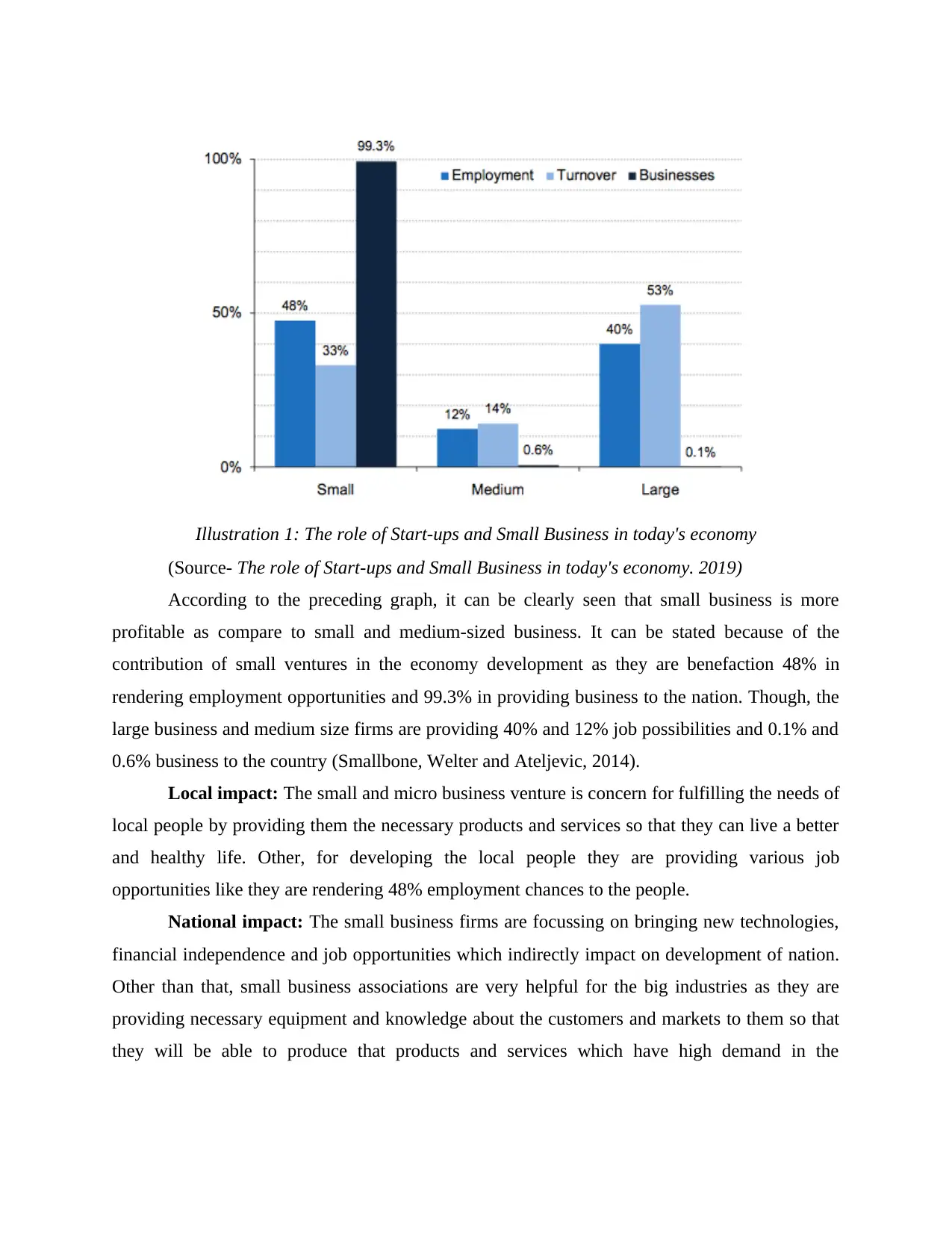
Illustration 1: The role of Start-ups and Small Business in today's economy
(Source- The role of Start-ups and Small Business in today's economy. 2019)
According to the preceding graph, it can be clearly seen that small business is more
profitable as compare to small and medium-sized business. It can be stated because of the
contribution of small ventures in the economy development as they are benefaction 48% in
rendering employment opportunities and 99.3% in providing business to the nation. Though, the
large business and medium size firms are providing 40% and 12% job possibilities and 0.1% and
0.6% business to the country (Smallbone, Welter and Ateljevic, 2014).
Local impact: The small and micro business venture is concern for fulfilling the needs of
local people by providing them the necessary products and services so that they can live a better
and healthy life. Other, for developing the local people they are providing various job
opportunities like they are rendering 48% employment chances to the people.
National impact: The small business firms are focussing on bringing new technologies,
financial independence and job opportunities which indirectly impact on development of nation.
Other than that, small business associations are very helpful for the big industries as they are
providing necessary equipment and knowledge about the customers and markets to them so that
they will be able to produce that products and services which have high demand in the
(Source- The role of Start-ups and Small Business in today's economy. 2019)
According to the preceding graph, it can be clearly seen that small business is more
profitable as compare to small and medium-sized business. It can be stated because of the
contribution of small ventures in the economy development as they are benefaction 48% in
rendering employment opportunities and 99.3% in providing business to the nation. Though, the
large business and medium size firms are providing 40% and 12% job possibilities and 0.1% and
0.6% business to the country (Smallbone, Welter and Ateljevic, 2014).
Local impact: The small and micro business venture is concern for fulfilling the needs of
local people by providing them the necessary products and services so that they can live a better
and healthy life. Other, for developing the local people they are providing various job
opportunities like they are rendering 48% employment chances to the people.
National impact: The small business firms are focussing on bringing new technologies,
financial independence and job opportunities which indirectly impact on development of nation.
Other than that, small business associations are very helpful for the big industries as they are
providing necessary equipment and knowledge about the customers and markets to them so that
they will be able to produce that products and services which have high demand in the
⊘ This is a preview!⊘
Do you want full access?
Subscribe today to unlock all pages.

Trusted by 1+ million students worldwide
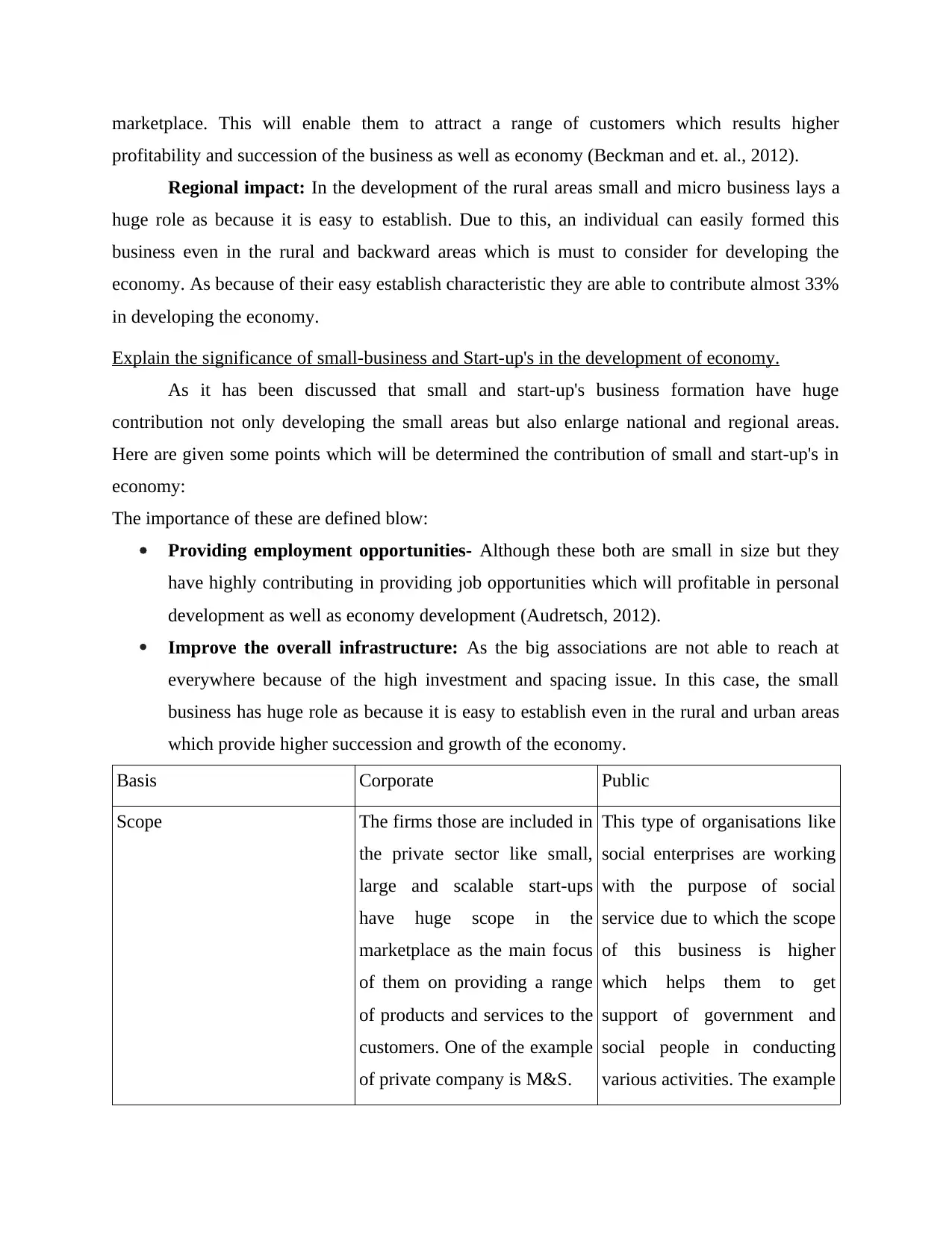
marketplace. This will enable them to attract a range of customers which results higher
profitability and succession of the business as well as economy (Beckman and et. al., 2012).
Regional impact: In the development of the rural areas small and micro business lays a
huge role as because it is easy to establish. Due to this, an individual can easily formed this
business even in the rural and backward areas which is must to consider for developing the
economy. As because of their easy establish characteristic they are able to contribute almost 33%
in developing the economy.
Explain the significance of small-business and Start-up's in the development of economy.
As it has been discussed that small and start-up's business formation have huge
contribution not only developing the small areas but also enlarge national and regional areas.
Here are given some points which will be determined the contribution of small and start-up's in
economy:
The importance of these are defined blow:
Providing employment opportunities- Although these both are small in size but they
have highly contributing in providing job opportunities which will profitable in personal
development as well as economy development (Audretsch, 2012).
Improve the overall infrastructure: As the big associations are not able to reach at
everywhere because of the high investment and spacing issue. In this case, the small
business has huge role as because it is easy to establish even in the rural and urban areas
which provide higher succession and growth of the economy.
Basis Corporate Public
Scope The firms those are included in
the private sector like small,
large and scalable start-ups
have huge scope in the
marketplace as the main focus
of them on providing a range
of products and services to the
customers. One of the example
of private company is M&S.
This type of organisations like
social enterprises are working
with the purpose of social
service due to which the scope
of this business is higher
which helps them to get
support of government and
social people in conducting
various activities. The example
profitability and succession of the business as well as economy (Beckman and et. al., 2012).
Regional impact: In the development of the rural areas small and micro business lays a
huge role as because it is easy to establish. Due to this, an individual can easily formed this
business even in the rural and backward areas which is must to consider for developing the
economy. As because of their easy establish characteristic they are able to contribute almost 33%
in developing the economy.
Explain the significance of small-business and Start-up's in the development of economy.
As it has been discussed that small and start-up's business formation have huge
contribution not only developing the small areas but also enlarge national and regional areas.
Here are given some points which will be determined the contribution of small and start-up's in
economy:
The importance of these are defined blow:
Providing employment opportunities- Although these both are small in size but they
have highly contributing in providing job opportunities which will profitable in personal
development as well as economy development (Audretsch, 2012).
Improve the overall infrastructure: As the big associations are not able to reach at
everywhere because of the high investment and spacing issue. In this case, the small
business has huge role as because it is easy to establish even in the rural and urban areas
which provide higher succession and growth of the economy.
Basis Corporate Public
Scope The firms those are included in
the private sector like small,
large and scalable start-ups
have huge scope in the
marketplace as the main focus
of them on providing a range
of products and services to the
customers. One of the example
of private company is M&S.
This type of organisations like
social enterprises are working
with the purpose of social
service due to which the scope
of this business is higher
which helps them to get
support of government and
social people in conducting
various activities. The example
Paraphrase This Document
Need a fresh take? Get an instant paraphrase of this document with our AI Paraphraser
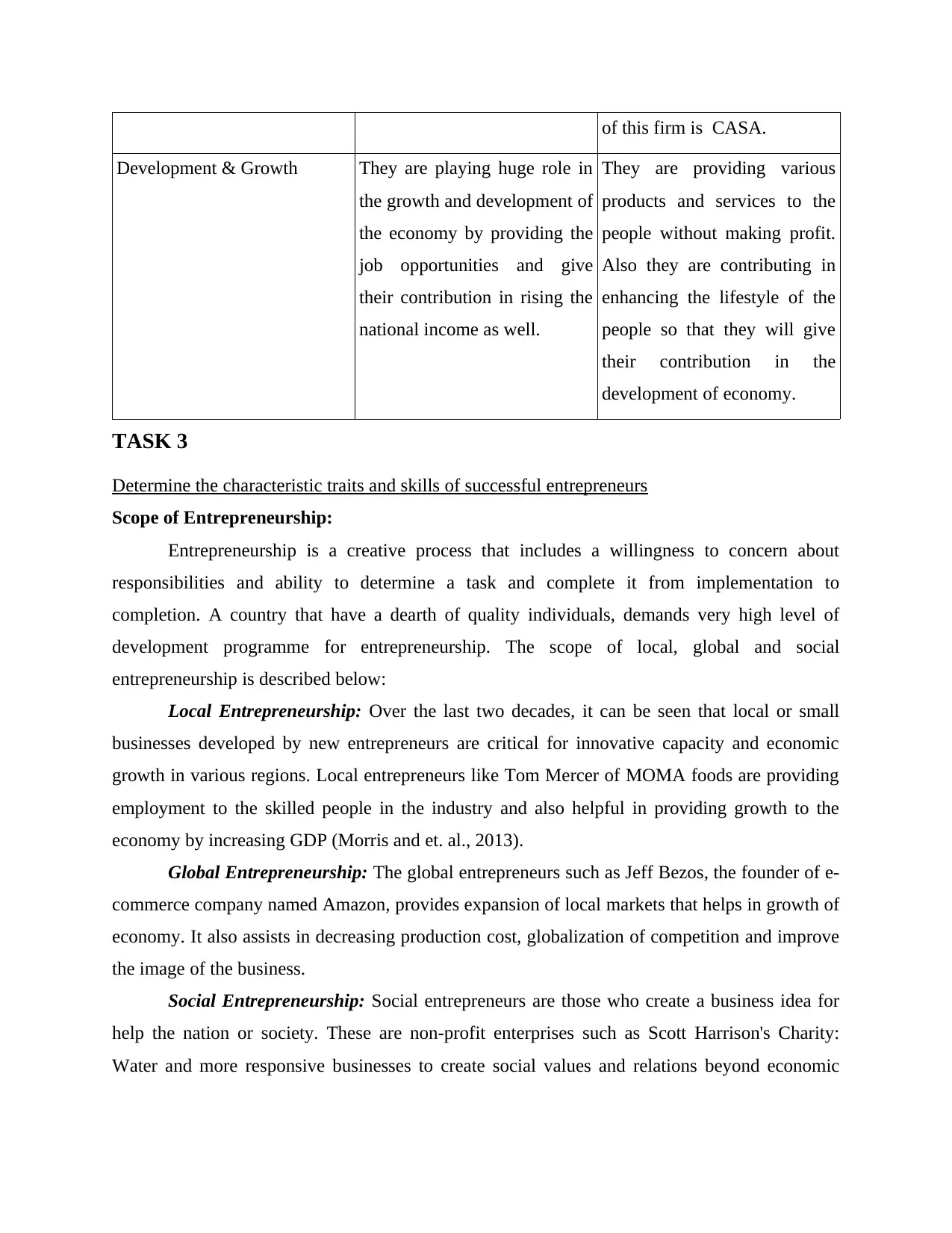
of this firm is CASA.
Development & Growth They are playing huge role in
the growth and development of
the economy by providing the
job opportunities and give
their contribution in rising the
national income as well.
They are providing various
products and services to the
people without making profit.
Also they are contributing in
enhancing the lifestyle of the
people so that they will give
their contribution in the
development of economy.
TASK 3
Determine the characteristic traits and skills of successful entrepreneurs
Scope of Entrepreneurship:
Entrepreneurship is a creative process that includes a willingness to concern about
responsibilities and ability to determine a task and complete it from implementation to
completion. A country that have a dearth of quality individuals, demands very high level of
development programme for entrepreneurship. The scope of local, global and social
entrepreneurship is described below:
Local Entrepreneurship: Over the last two decades, it can be seen that local or small
businesses developed by new entrepreneurs are critical for innovative capacity and economic
growth in various regions. Local entrepreneurs like Tom Mercer of MOMA foods are providing
employment to the skilled people in the industry and also helpful in providing growth to the
economy by increasing GDP (Morris and et. al., 2013).
Global Entrepreneurship: The global entrepreneurs such as Jeff Bezos, the founder of e-
commerce company named Amazon, provides expansion of local markets that helps in growth of
economy. It also assists in decreasing production cost, globalization of competition and improve
the image of the business.
Social Entrepreneurship: Social entrepreneurs are those who create a business idea for
help the nation or society. These are non-profit enterprises such as Scott Harrison's Charity:
Water and more responsive businesses to create social values and relations beyond economic
Development & Growth They are playing huge role in
the growth and development of
the economy by providing the
job opportunities and give
their contribution in rising the
national income as well.
They are providing various
products and services to the
people without making profit.
Also they are contributing in
enhancing the lifestyle of the
people so that they will give
their contribution in the
development of economy.
TASK 3
Determine the characteristic traits and skills of successful entrepreneurs
Scope of Entrepreneurship:
Entrepreneurship is a creative process that includes a willingness to concern about
responsibilities and ability to determine a task and complete it from implementation to
completion. A country that have a dearth of quality individuals, demands very high level of
development programme for entrepreneurship. The scope of local, global and social
entrepreneurship is described below:
Local Entrepreneurship: Over the last two decades, it can be seen that local or small
businesses developed by new entrepreneurs are critical for innovative capacity and economic
growth in various regions. Local entrepreneurs like Tom Mercer of MOMA foods are providing
employment to the skilled people in the industry and also helpful in providing growth to the
economy by increasing GDP (Morris and et. al., 2013).
Global Entrepreneurship: The global entrepreneurs such as Jeff Bezos, the founder of e-
commerce company named Amazon, provides expansion of local markets that helps in growth of
economy. It also assists in decreasing production cost, globalization of competition and improve
the image of the business.
Social Entrepreneurship: Social entrepreneurs are those who create a business idea for
help the nation or society. These are non-profit enterprises such as Scott Harrison's Charity:
Water and more responsive businesses to create social values and relations beyond economic
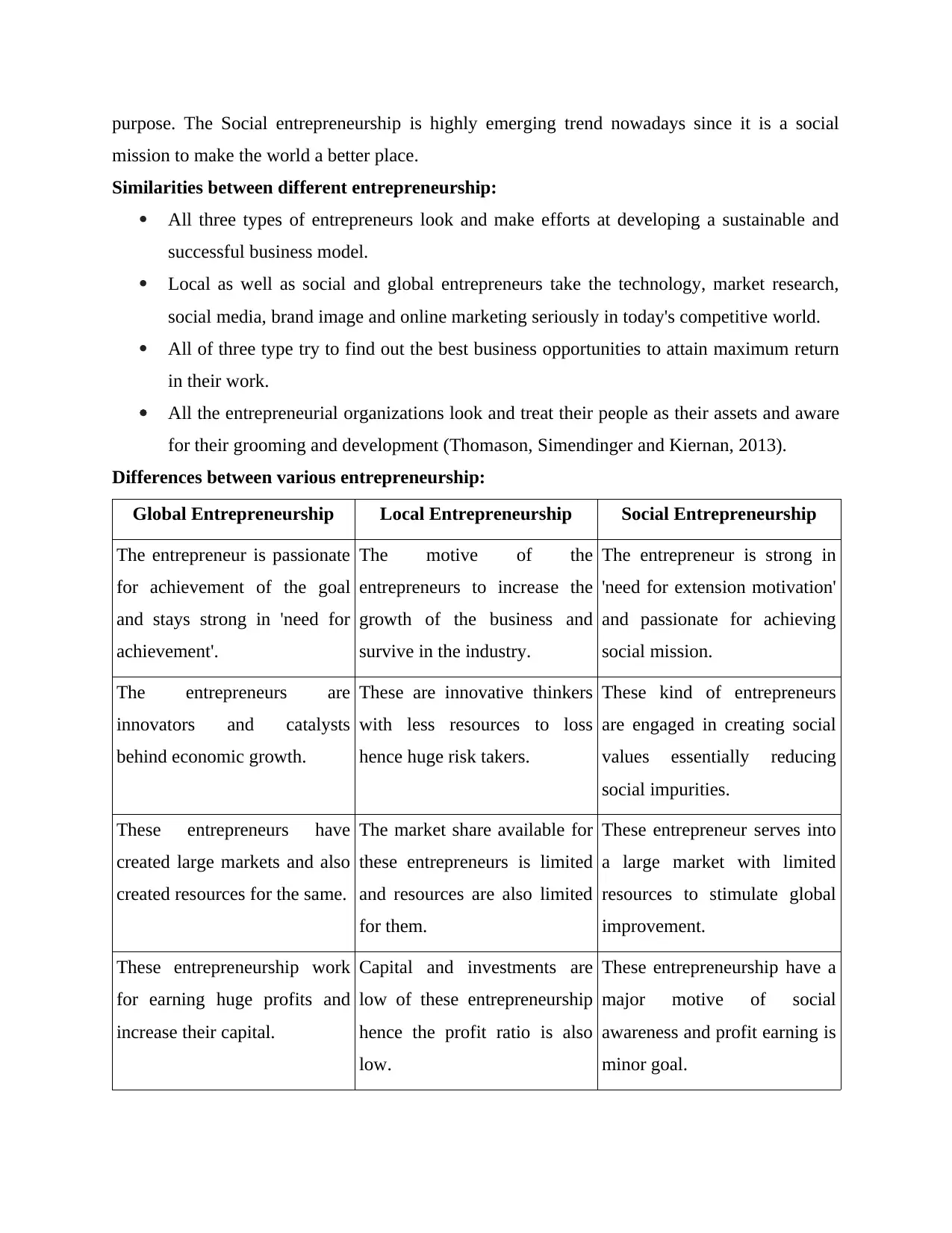
purpose. The Social entrepreneurship is highly emerging trend nowadays since it is a social
mission to make the world a better place.
Similarities between different entrepreneurship:
All three types of entrepreneurs look and make efforts at developing a sustainable and
successful business model.
Local as well as social and global entrepreneurs take the technology, market research,
social media, brand image and online marketing seriously in today's competitive world.
All of three type try to find out the best business opportunities to attain maximum return
in their work.
All the entrepreneurial organizations look and treat their people as their assets and aware
for their grooming and development (Thomason, Simendinger and Kiernan, 2013).
Differences between various entrepreneurship:
Global Entrepreneurship Local Entrepreneurship Social Entrepreneurship
The entrepreneur is passionate
for achievement of the goal
and stays strong in 'need for
achievement'.
The motive of the
entrepreneurs to increase the
growth of the business and
survive in the industry.
The entrepreneur is strong in
'need for extension motivation'
and passionate for achieving
social mission.
The entrepreneurs are
innovators and catalysts
behind economic growth.
These are innovative thinkers
with less resources to loss
hence huge risk takers.
These kind of entrepreneurs
are engaged in creating social
values essentially reducing
social impurities.
These entrepreneurs have
created large markets and also
created resources for the same.
The market share available for
these entrepreneurs is limited
and resources are also limited
for them.
These entrepreneur serves into
a large market with limited
resources to stimulate global
improvement.
These entrepreneurship work
for earning huge profits and
increase their capital.
Capital and investments are
low of these entrepreneurship
hence the profit ratio is also
low.
These entrepreneurship have a
major motive of social
awareness and profit earning is
minor goal.
mission to make the world a better place.
Similarities between different entrepreneurship:
All three types of entrepreneurs look and make efforts at developing a sustainable and
successful business model.
Local as well as social and global entrepreneurs take the technology, market research,
social media, brand image and online marketing seriously in today's competitive world.
All of three type try to find out the best business opportunities to attain maximum return
in their work.
All the entrepreneurial organizations look and treat their people as their assets and aware
for their grooming and development (Thomason, Simendinger and Kiernan, 2013).
Differences between various entrepreneurship:
Global Entrepreneurship Local Entrepreneurship Social Entrepreneurship
The entrepreneur is passionate
for achievement of the goal
and stays strong in 'need for
achievement'.
The motive of the
entrepreneurs to increase the
growth of the business and
survive in the industry.
The entrepreneur is strong in
'need for extension motivation'
and passionate for achieving
social mission.
The entrepreneurs are
innovators and catalysts
behind economic growth.
These are innovative thinkers
with less resources to loss
hence huge risk takers.
These kind of entrepreneurs
are engaged in creating social
values essentially reducing
social impurities.
These entrepreneurs have
created large markets and also
created resources for the same.
The market share available for
these entrepreneurs is limited
and resources are also limited
for them.
These entrepreneur serves into
a large market with limited
resources to stimulate global
improvement.
These entrepreneurship work
for earning huge profits and
increase their capital.
Capital and investments are
low of these entrepreneurship
hence the profit ratio is also
low.
These entrepreneurship have a
major motive of social
awareness and profit earning is
minor goal.
⊘ This is a preview!⊘
Do you want full access?
Subscribe today to unlock all pages.

Trusted by 1+ million students worldwide
1 out of 17
Related Documents
Your All-in-One AI-Powered Toolkit for Academic Success.
+13062052269
info@desklib.com
Available 24*7 on WhatsApp / Email
![[object Object]](/_next/static/media/star-bottom.7253800d.svg)
Unlock your academic potential
Copyright © 2020–2026 A2Z Services. All Rights Reserved. Developed and managed by ZUCOL.





